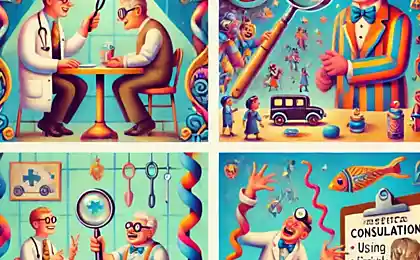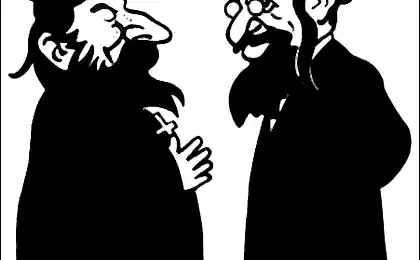923
"God forbid I get crazy"
8 most fascinating mental disorders in the history of psychiatry.
About crazy always interesting to read. About crazy interesting read doubly interesting, and doubly always. Especially twice about a split personality when two crazy for the price of one.
Yes, we like to write about the mentally ill. First, on their background it is easier to feel dushevnozdorovymi. Secondly, Kant has said that there is nothing in the world more interesting than the stars in the sky, and all sorts of oddities in the human brain. Here you go, used to wear in peace on the shoulders of your head and you do not expect from her is no catch. Although the powder keg with a lit wick would be, perhaps, slightly more dangerous - so much amazing things can sometimes be up to the people of their consciousness.
8 most fascinating mental disorders in the history of psychiatry
And do not forget: it is often only by studying the broken thing, you can understand how it should work ideally. That psychiatry created at the time that the basis on which evolved the modern science of thinking in general, such as neuroscience, neurophysiology, evolutionary psychology, and so on. D. And in purely educational purposes, and not to his heart's content to scare his audience with all sorts of horrors We have collected eight case histories describing the case of rare and very interesting syndromes.
A source.
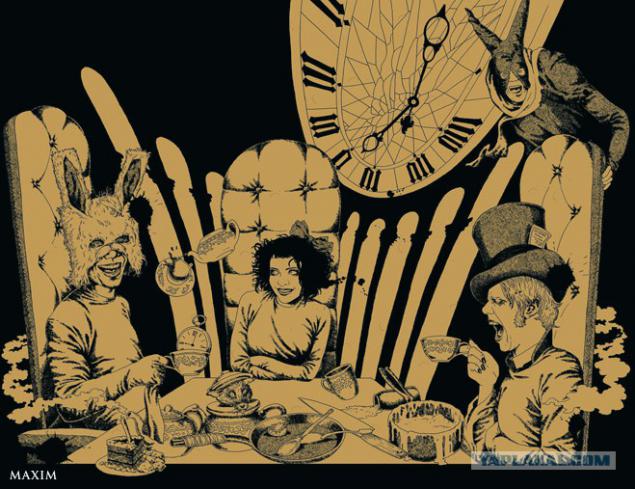
Without control
In the 20's - 30-ies of XX century in the German clinic "Charite" seven years, he was treated for a former employee of the post office Dieter Weise. Mr. Weise The problem was that he could not control his body. The only thing he could not control - is speech and breathing. All the rest was driven by some Peter, who was a big bastard. Attending physicians have not been able to meet with Peter: one in contact with humanity was not included, all communications Dieter left, and he came off in full. Richard Shtyube, the patient's attending physician, wrote: "AMAZING clear and sensible speech of the patient - it exhausted but completely healthy person." While Peter was masturbating in front of the nurses, banging his head against the wall, crawling on all fours under the beds and throw feces nurses, Dieter Weise tired voice asked for forgiveness and begged those around immediately put on a straitjacket. Light of world psychiatry have long argued, as the disease should typeable Mr. Weise. Some were in favor of an unusual form of schizophrenia, while others have assumed that they were dealing with an advanced version of the "alien hand syndrome," in which the brain loses volitional control of neurons associated with a particular part of the body. To find out it did not succeed: in 1932 a patient Weise left unattended for long, tucked a piece of sheet drainer sink in his room, waited for a sufficient water and drowned himself, dropping his head into the sink. "It was definitely a murder - and then reflect on Dr. Shtyube. - It is terrible to imagine feeling Dieter at the moment when the unknown invader occupied his body, forced Dieter bend over the sink ... "The man who had put his wife for a hat
The book, in which the American psychiatrist Oliver Sacks described the clinical case, and is called - "The man who took his wife for a hat." In the 60-ies of the last century, Mr. Sachs was asked to explore the famous musician, teacher of the conservatory, which Sachs calls "Professor P.". Professor P. was no longer young, and his whole life reputation of weirdo that did not stop him at first to be a famous singer, and then - a respected teacher and start a family and live happily with his wife for years. Here's the husband is concerned that recently became a professor certainly something completely unpredictable. Sachs spoke to the musician, did not find much weirdness, minus some eccentricity, and they leave. And then the professor made a very surprising thing. Approaching his wife, he held out his hand, felt her head gesture, which usually take a hat, and made an attempt to put the extracted thus the object itself. My wife twisted finger, professor moved them in the air and thought. Sachs made a hunting stand and took the professor into circulation. They met regularly and talked, passed a lot of tests.
It turned out the following. Professor worldview suffered catastrophic holes. He looked like a man who is trying to look around in a dark closet with a weak flashlight. He almost did not distinguish people visually, but most recognize the voice. Worse, he very often confuse people with inanimate objects. He could remember the item - a mustache, cigar, big teeth, but was not able to find any human face and could easily be mistaken for a man cabbage or lamp. Looking at the landscape, he could not see most of the houses, people and human figures - they seem to fall into a kind of blind spot. When Sachs laid out on the table a few items, the professor sometimes able to identify any one of them, the rest of it just did not notice and was very surprised when they said that under his nose except notebook are still a saucer, a comb and a handkerchief. The reality of these things, he agreed to accept just having felt them. When the doctor gave him a rose and asked to say what it is, the professor described the flower as "oblong dark green with red extension on one end." Just sniffing the subject, he determined that it rose. His vision was fine, but the signals received by means of visual transmission, the brain assimilate only ten percent. Eventually Sachs diagnosed with Professor P. innate agnosia - a pathological disorder of perception, though very high quality offset by rich experience and well-educated patient who, instead of seeing the world in the chaos of mostly hard-defined objects, still managed to become a social success and a happy person.
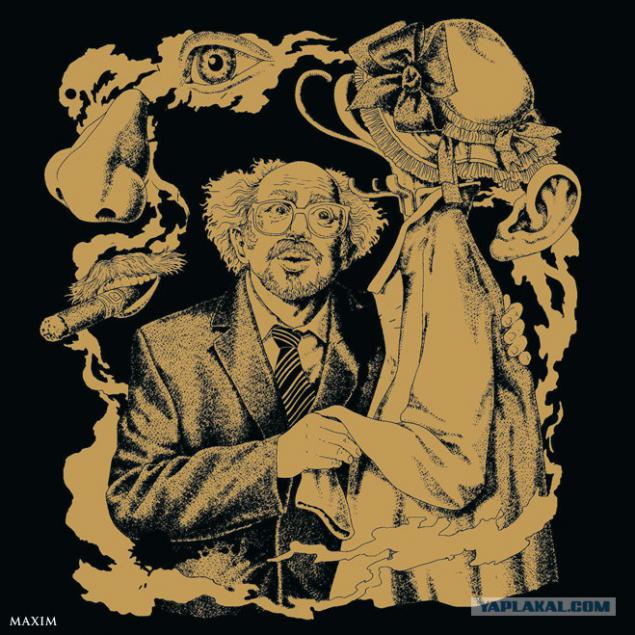
Frozen horror
Autism, which with a light hand the authors of "Rain Man" is now the general public is often confused with genius - the disease, the study is still totally inadequate. Many scientists believe that there is more appropriate to speak about a group of various pathologies with common characteristics. For example, it is known that part of the autistic virtually incapable of aggression; Others, however, suffer from severe and prolonged bouts of uncontrolled anger directed at others; Still others, feeling anger and fear, prefer to injure themselves. The behavior of the autistic Aydena S., 19 years old, who was for some time under observation in the hospital at the University of Pennsylvania, is the fourth, most rare category. Like many autistics, Aiden is incredibly dependent on the mode of the day, the stability of the surrounding situation and sensitive to any innovation. Therefore, any "wrong" action relatives or medical staff makes Aydena catatonic attack: a young man dies in the position in which he happened to run into "dangerous" - his pajamas unpleasant colors, loud noise, unfamiliar food. His muscles completely woody, and if the position at the time of the attack was unsuitable for balance, the patient with a bang falls to the floor, and without changing this position. No force can not straighten his arm or leg, nothing is broken. Being in this position, Aiden could indefinitely. Therefore, the doctors once again Aiden "wedge", performed a traditional ritual, once developed Aiden's mother. The body is introduced into a completely dark room, and then one of the doctors whispered read it by rote for half an hour nursery rhymes from "Tales of Mother Goose," and after a while Aiden regaining the ability to move normally. A man of many faces
Previously mentioned Oliver Sacks in his work often recalls a patient who suffered from a rare syndrome called "Korsakoff's psychosis." The former grocer Mr. Thompson was taken to the hospital friends once went mad on the basis of long-term alcohol abuse. No, Mr. Thompson throws at people, not hurt anyone and is very sociable. Mr. Thompson's problem is that he has lost his identity and surrounding reality and memory. When Mr. Thompson was not asleep, he trades. Wherever he was - in the House, in a doctor's office or in the whirlpool bath in the session - he is at the counter, wiping her hands on her apron and talking with another visitor. His term memory - about forty seconds.
- You sausages or maybe salmon? - He asks. - What are you in a white coat, Mr. Smith? Or are you in a kosher shop is now such rules? And why are you suddenly grew a beard, Mr. Smith? Something I do not think ... I'm at the shop or anywhere?
Then his brow smoothed again serene, and it offers a new "buyer" to buy half a pound of ham and smoked sausage.
However, forty seconds, Mr. Thompson also has time to roam. He poisons stories. He expresses improbable assumptions about the identity of the buyer. He finds hundreds of compelling and always different explanations as to why he suddenly dropped out because of its counter and found himself in an unfamiliar office.
- A stethoscope! - He shouts suddenly. - That's because you, mechanics, wonderful people! Pose as doctors: white coats, stethoscopes ... Listen, they say, the machines as people! Manners, old man, how are things at the gas station? Come, come, you will be as usual - with black bread and sausage ...
"Within five minutes, - says Dr. Sacks - Mr. Thompson takes me a dozen different people. In his mind, nothing held more than a few seconds, and as a result he is constantly disoriented, he invents more and more unconvincing stories, constantly writing about a world - the universe of "A Thousand and One Nights", a dream, a phantasmagoria of people and images Kaleidoscope continuous metamorphosis and transformations. And for him it is not a series of fleeting fantasies and illusions, but a normal, stable, real world. From his point of view, everything is in order. "

The first Martian on Earth
Stoyan Stoyanov Bulgarian psychiatrist (yes, Bulgarian parents, too, are brilliant insights) in the 50-ies of XX century for a long time watching the patient P., which would be ordinary schizophrenic, had with him the case of periodic bouts of so-called grёzopodobnogo oneiric. Attacks occur about once every two months. First, the patient begins to experience anxiety, then I stopped to sleep, and after three or four days left the hospital and went straight to Mars. According to the doctor, during these hallucinations the patient changed drastically: from unsociable, gloomy, with a primitive speech, and limited imagination, he turned into a man with a good set of artistic speech. Typically, during an attack of R. slowly hovered in a circle in the center of his room. At that time, he was willing to answer any questions, but was clearly unable to see any interlocutor or surrounding objects, so constantly blew on them (which is why at the time of its seizure was converted into a "soft room"). R. techniques described in the Martian palaces, fights on the huge animals, flocks of birds flying leatherback on the orange horizon, his complex relationship with Martian aristocracy (especially the one of the princesses, with which it, however, binds perfectly platonic sense). Dr. Stoyanov underscores the exceptional accuracy detalirovok: all attacks always occurred on Mars in the same situation. For several years, the doctor took notes, R. was never caught in the contradiction: if he said that the columns in the side hall of the palace princess made of greenish stone - coil, then three years later, "seeing" these columns, he just repeat previously made description. We now know that hallucinations during grёzopodobnogo oneiric have exclusive reality for hallucinating, they are more detailed, meaningful and longer than any sleep, but too easily forgotten after the "awakening."
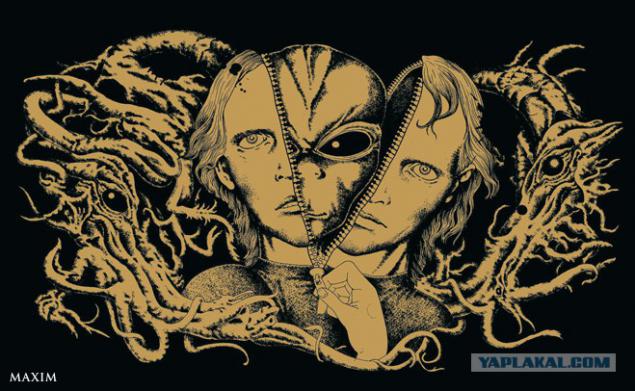
Nelyubimets words
Receptive aphasia - diagnosis such 33-year-old Muscovite Anton G. surviving a traumatic brain injury. Conversations with him were published in the "Bulletin of the Association of Psychiatrists' (2011). After the accident, Anton can not understand the words they seemed to have changed in his dictionary, looking up from his values and mix as the spirit lay.
- I threw Bryl, - he says - welled drin. Well, so, roundish, which napodkrutyat edifice.
- Rudder?
- Yes. Bryl. Dokoro let zabodnya tumbleweed. Shoe buchit.
- The head? Do you have a headache?
- Yes. At dashing gas. Between tears. Ipodalno.
This is not a defect of speech, it is a violation of her understanding. Anton hard to talk to people. They speak some language unfamiliar to him, in which he struggled to catch barely familiar harmonies. Therefore, it is easier to communicate with gestures. He, too, had forgotten how to read - on the plates at a hospital written some wild combinations of letters. Anton wrote himself instead of his name "aknlpor" instead of the word "machine" (it shows the car in the picture and slowly repeated several times, "ma-shi-na"), he hesitantly takes a long series of consonants, on the whole line. Neurology and speech therapists are able to cope with some problems in aphasia. Although long-term therapy to be Anton, he has a chance to go back to a world full of intelligent words and meaning.
Infinite happiness
Edelfrida S. - gebefrenik. She was good. Her doctor, a well-known German psychiatrist Manfred Lutz, author of the bestseller "It's crazy, we do not treat those!" Loves gebefrenikov. From the point of view of the doctor Lyutsa, not only psychiatrists, but also a theologian, it is only necessary to treat those who suffer from their mental illness. A gebefreniki - very happy people. However, if hebephrenia, like Edelfridy, paired with incurable brain tumors, they live still better in the clinic. Hebephrenia - it's always a great, fun and playful mood, even if the reasons for joy, from the standpoint of others, have no gebefrenika. For example, sixty years bedridden Edelfrida scary fun that explains why it is impossible to do the surgery so she would die within six months.
- Bryk - Lean and hooves! - She laughs.
- And you are not sad? - Asks Dr. Lutz.
- Why did it happen? What nonsense! What a difference to me - I'm alive or dead?
Nothing in the world could hurt or upset Edelfridu. She does not remember his life, vaguely understands where it is, and the concept of "I" virtually nothing to her means. She happily eats only occasionally dipping a spoon to his heart's content to laugh at sea cabbage soup or a piece of muffin scare nurse or doctor.
- Aw-aw! - She says laughing and leaping.
- That you have a dog? - Asked the doctor.
- What are you, doctor! It's a bun! And so here you have the brains are going to treat me ?! That is hilarious! "Strictly speaking, - says Lutz - Edelfridy us are long gone. Her personality was gone, leaving behind this is the pure sense of humor in the body of a dying woman. " In someone else's body
And finally, back again to Dr. Sachs, gathered perhaps the most brilliant collection of madness in modern psychiatry. One of the chapters of his book "The man who took his wife for a hat" is devoted to 27-year-old patient named Christina. Christina was a perfectly normal person, she went to the hospital because of the need for a gall bladder operation. What happened there, some of the measures of preoperative therapy resulted in a so strange consequences - remains unclear. But the day before surgery Christina forgotten how to walk, sit up in bed and use his hands. To her first invited neurologist, Dr. Sachs then of the Department of Psychiatry. It turned out that mysteriously disappeared Christina proprioception - joint and muscular sense. Part of the parietal brain responsible for the coordination and the feeling of his body in space, has become idle. Christina almost could not speak - she did not know how to control the vocal cords. Take something she could only eyes watching intently over her hand. Most of all her feelings were like a man feeling enclosed in the body of the robot, which can be operated correctly and consistently pulling levers.
"Ceased to receive a response from the internal body - writes Oliver Sacks - Christina still treats it as a dead, alien appendage, she could not feel his own. She can not even find the words to convey his state, and it has to be described by analogy with the other senses.
- I think - she says - that my body is deaf and blinded myself ... absolutely does not feel ... »
Eight years of therapy and hard workouts took to the woman was able to move again. She had been taught to rearrange his feet, watching their eyes.
Source:
About crazy always interesting to read. About crazy interesting read doubly interesting, and doubly always. Especially twice about a split personality when two crazy for the price of one.
Yes, we like to write about the mentally ill. First, on their background it is easier to feel dushevnozdorovymi. Secondly, Kant has said that there is nothing in the world more interesting than the stars in the sky, and all sorts of oddities in the human brain. Here you go, used to wear in peace on the shoulders of your head and you do not expect from her is no catch. Although the powder keg with a lit wick would be, perhaps, slightly more dangerous - so much amazing things can sometimes be up to the people of their consciousness.
8 most fascinating mental disorders in the history of psychiatry
And do not forget: it is often only by studying the broken thing, you can understand how it should work ideally. That psychiatry created at the time that the basis on which evolved the modern science of thinking in general, such as neuroscience, neurophysiology, evolutionary psychology, and so on. D. And in purely educational purposes, and not to his heart's content to scare his audience with all sorts of horrors We have collected eight case histories describing the case of rare and very interesting syndromes.
A source.

Without control
In the 20's - 30-ies of XX century in the German clinic "Charite" seven years, he was treated for a former employee of the post office Dieter Weise. Mr. Weise The problem was that he could not control his body. The only thing he could not control - is speech and breathing. All the rest was driven by some Peter, who was a big bastard. Attending physicians have not been able to meet with Peter: one in contact with humanity was not included, all communications Dieter left, and he came off in full. Richard Shtyube, the patient's attending physician, wrote: "AMAZING clear and sensible speech of the patient - it exhausted but completely healthy person." While Peter was masturbating in front of the nurses, banging his head against the wall, crawling on all fours under the beds and throw feces nurses, Dieter Weise tired voice asked for forgiveness and begged those around immediately put on a straitjacket. Light of world psychiatry have long argued, as the disease should typeable Mr. Weise. Some were in favor of an unusual form of schizophrenia, while others have assumed that they were dealing with an advanced version of the "alien hand syndrome," in which the brain loses volitional control of neurons associated with a particular part of the body. To find out it did not succeed: in 1932 a patient Weise left unattended for long, tucked a piece of sheet drainer sink in his room, waited for a sufficient water and drowned himself, dropping his head into the sink. "It was definitely a murder - and then reflect on Dr. Shtyube. - It is terrible to imagine feeling Dieter at the moment when the unknown invader occupied his body, forced Dieter bend over the sink ... "The man who had put his wife for a hat
The book, in which the American psychiatrist Oliver Sacks described the clinical case, and is called - "The man who took his wife for a hat." In the 60-ies of the last century, Mr. Sachs was asked to explore the famous musician, teacher of the conservatory, which Sachs calls "Professor P.". Professor P. was no longer young, and his whole life reputation of weirdo that did not stop him at first to be a famous singer, and then - a respected teacher and start a family and live happily with his wife for years. Here's the husband is concerned that recently became a professor certainly something completely unpredictable. Sachs spoke to the musician, did not find much weirdness, minus some eccentricity, and they leave. And then the professor made a very surprising thing. Approaching his wife, he held out his hand, felt her head gesture, which usually take a hat, and made an attempt to put the extracted thus the object itself. My wife twisted finger, professor moved them in the air and thought. Sachs made a hunting stand and took the professor into circulation. They met regularly and talked, passed a lot of tests.
It turned out the following. Professor worldview suffered catastrophic holes. He looked like a man who is trying to look around in a dark closet with a weak flashlight. He almost did not distinguish people visually, but most recognize the voice. Worse, he very often confuse people with inanimate objects. He could remember the item - a mustache, cigar, big teeth, but was not able to find any human face and could easily be mistaken for a man cabbage or lamp. Looking at the landscape, he could not see most of the houses, people and human figures - they seem to fall into a kind of blind spot. When Sachs laid out on the table a few items, the professor sometimes able to identify any one of them, the rest of it just did not notice and was very surprised when they said that under his nose except notebook are still a saucer, a comb and a handkerchief. The reality of these things, he agreed to accept just having felt them. When the doctor gave him a rose and asked to say what it is, the professor described the flower as "oblong dark green with red extension on one end." Just sniffing the subject, he determined that it rose. His vision was fine, but the signals received by means of visual transmission, the brain assimilate only ten percent. Eventually Sachs diagnosed with Professor P. innate agnosia - a pathological disorder of perception, though very high quality offset by rich experience and well-educated patient who, instead of seeing the world in the chaos of mostly hard-defined objects, still managed to become a social success and a happy person.

Frozen horror
Autism, which with a light hand the authors of "Rain Man" is now the general public is often confused with genius - the disease, the study is still totally inadequate. Many scientists believe that there is more appropriate to speak about a group of various pathologies with common characteristics. For example, it is known that part of the autistic virtually incapable of aggression; Others, however, suffer from severe and prolonged bouts of uncontrolled anger directed at others; Still others, feeling anger and fear, prefer to injure themselves. The behavior of the autistic Aydena S., 19 years old, who was for some time under observation in the hospital at the University of Pennsylvania, is the fourth, most rare category. Like many autistics, Aiden is incredibly dependent on the mode of the day, the stability of the surrounding situation and sensitive to any innovation. Therefore, any "wrong" action relatives or medical staff makes Aydena catatonic attack: a young man dies in the position in which he happened to run into "dangerous" - his pajamas unpleasant colors, loud noise, unfamiliar food. His muscles completely woody, and if the position at the time of the attack was unsuitable for balance, the patient with a bang falls to the floor, and without changing this position. No force can not straighten his arm or leg, nothing is broken. Being in this position, Aiden could indefinitely. Therefore, the doctors once again Aiden "wedge", performed a traditional ritual, once developed Aiden's mother. The body is introduced into a completely dark room, and then one of the doctors whispered read it by rote for half an hour nursery rhymes from "Tales of Mother Goose," and after a while Aiden regaining the ability to move normally. A man of many faces
Previously mentioned Oliver Sacks in his work often recalls a patient who suffered from a rare syndrome called "Korsakoff's psychosis." The former grocer Mr. Thompson was taken to the hospital friends once went mad on the basis of long-term alcohol abuse. No, Mr. Thompson throws at people, not hurt anyone and is very sociable. Mr. Thompson's problem is that he has lost his identity and surrounding reality and memory. When Mr. Thompson was not asleep, he trades. Wherever he was - in the House, in a doctor's office or in the whirlpool bath in the session - he is at the counter, wiping her hands on her apron and talking with another visitor. His term memory - about forty seconds.
- You sausages or maybe salmon? - He asks. - What are you in a white coat, Mr. Smith? Or are you in a kosher shop is now such rules? And why are you suddenly grew a beard, Mr. Smith? Something I do not think ... I'm at the shop or anywhere?
Then his brow smoothed again serene, and it offers a new "buyer" to buy half a pound of ham and smoked sausage.
However, forty seconds, Mr. Thompson also has time to roam. He poisons stories. He expresses improbable assumptions about the identity of the buyer. He finds hundreds of compelling and always different explanations as to why he suddenly dropped out because of its counter and found himself in an unfamiliar office.
- A stethoscope! - He shouts suddenly. - That's because you, mechanics, wonderful people! Pose as doctors: white coats, stethoscopes ... Listen, they say, the machines as people! Manners, old man, how are things at the gas station? Come, come, you will be as usual - with black bread and sausage ...
"Within five minutes, - says Dr. Sacks - Mr. Thompson takes me a dozen different people. In his mind, nothing held more than a few seconds, and as a result he is constantly disoriented, he invents more and more unconvincing stories, constantly writing about a world - the universe of "A Thousand and One Nights", a dream, a phantasmagoria of people and images Kaleidoscope continuous metamorphosis and transformations. And for him it is not a series of fleeting fantasies and illusions, but a normal, stable, real world. From his point of view, everything is in order. "

The first Martian on Earth
Stoyan Stoyanov Bulgarian psychiatrist (yes, Bulgarian parents, too, are brilliant insights) in the 50-ies of XX century for a long time watching the patient P., which would be ordinary schizophrenic, had with him the case of periodic bouts of so-called grёzopodobnogo oneiric. Attacks occur about once every two months. First, the patient begins to experience anxiety, then I stopped to sleep, and after three or four days left the hospital and went straight to Mars. According to the doctor, during these hallucinations the patient changed drastically: from unsociable, gloomy, with a primitive speech, and limited imagination, he turned into a man with a good set of artistic speech. Typically, during an attack of R. slowly hovered in a circle in the center of his room. At that time, he was willing to answer any questions, but was clearly unable to see any interlocutor or surrounding objects, so constantly blew on them (which is why at the time of its seizure was converted into a "soft room"). R. techniques described in the Martian palaces, fights on the huge animals, flocks of birds flying leatherback on the orange horizon, his complex relationship with Martian aristocracy (especially the one of the princesses, with which it, however, binds perfectly platonic sense). Dr. Stoyanov underscores the exceptional accuracy detalirovok: all attacks always occurred on Mars in the same situation. For several years, the doctor took notes, R. was never caught in the contradiction: if he said that the columns in the side hall of the palace princess made of greenish stone - coil, then three years later, "seeing" these columns, he just repeat previously made description. We now know that hallucinations during grёzopodobnogo oneiric have exclusive reality for hallucinating, they are more detailed, meaningful and longer than any sleep, but too easily forgotten after the "awakening."

Nelyubimets words
Receptive aphasia - diagnosis such 33-year-old Muscovite Anton G. surviving a traumatic brain injury. Conversations with him were published in the "Bulletin of the Association of Psychiatrists' (2011). After the accident, Anton can not understand the words they seemed to have changed in his dictionary, looking up from his values and mix as the spirit lay.
- I threw Bryl, - he says - welled drin. Well, so, roundish, which napodkrutyat edifice.
- Rudder?
- Yes. Bryl. Dokoro let zabodnya tumbleweed. Shoe buchit.
- The head? Do you have a headache?
- Yes. At dashing gas. Between tears. Ipodalno.
This is not a defect of speech, it is a violation of her understanding. Anton hard to talk to people. They speak some language unfamiliar to him, in which he struggled to catch barely familiar harmonies. Therefore, it is easier to communicate with gestures. He, too, had forgotten how to read - on the plates at a hospital written some wild combinations of letters. Anton wrote himself instead of his name "aknlpor" instead of the word "machine" (it shows the car in the picture and slowly repeated several times, "ma-shi-na"), he hesitantly takes a long series of consonants, on the whole line. Neurology and speech therapists are able to cope with some problems in aphasia. Although long-term therapy to be Anton, he has a chance to go back to a world full of intelligent words and meaning.
Infinite happiness
Edelfrida S. - gebefrenik. She was good. Her doctor, a well-known German psychiatrist Manfred Lutz, author of the bestseller "It's crazy, we do not treat those!" Loves gebefrenikov. From the point of view of the doctor Lyutsa, not only psychiatrists, but also a theologian, it is only necessary to treat those who suffer from their mental illness. A gebefreniki - very happy people. However, if hebephrenia, like Edelfridy, paired with incurable brain tumors, they live still better in the clinic. Hebephrenia - it's always a great, fun and playful mood, even if the reasons for joy, from the standpoint of others, have no gebefrenika. For example, sixty years bedridden Edelfrida scary fun that explains why it is impossible to do the surgery so she would die within six months.
- Bryk - Lean and hooves! - She laughs.
- And you are not sad? - Asks Dr. Lutz.
- Why did it happen? What nonsense! What a difference to me - I'm alive or dead?
Nothing in the world could hurt or upset Edelfridu. She does not remember his life, vaguely understands where it is, and the concept of "I" virtually nothing to her means. She happily eats only occasionally dipping a spoon to his heart's content to laugh at sea cabbage soup or a piece of muffin scare nurse or doctor.
- Aw-aw! - She says laughing and leaping.
- That you have a dog? - Asked the doctor.
- What are you, doctor! It's a bun! And so here you have the brains are going to treat me ?! That is hilarious! "Strictly speaking, - says Lutz - Edelfridy us are long gone. Her personality was gone, leaving behind this is the pure sense of humor in the body of a dying woman. " In someone else's body
And finally, back again to Dr. Sachs, gathered perhaps the most brilliant collection of madness in modern psychiatry. One of the chapters of his book "The man who took his wife for a hat" is devoted to 27-year-old patient named Christina. Christina was a perfectly normal person, she went to the hospital because of the need for a gall bladder operation. What happened there, some of the measures of preoperative therapy resulted in a so strange consequences - remains unclear. But the day before surgery Christina forgotten how to walk, sit up in bed and use his hands. To her first invited neurologist, Dr. Sachs then of the Department of Psychiatry. It turned out that mysteriously disappeared Christina proprioception - joint and muscular sense. Part of the parietal brain responsible for the coordination and the feeling of his body in space, has become idle. Christina almost could not speak - she did not know how to control the vocal cords. Take something she could only eyes watching intently over her hand. Most of all her feelings were like a man feeling enclosed in the body of the robot, which can be operated correctly and consistently pulling levers.
"Ceased to receive a response from the internal body - writes Oliver Sacks - Christina still treats it as a dead, alien appendage, she could not feel his own. She can not even find the words to convey his state, and it has to be described by analogy with the other senses.
- I think - she says - that my body is deaf and blinded myself ... absolutely does not feel ... »
Eight years of therapy and hard workouts took to the woman was able to move again. She had been taught to rearrange his feet, watching their eyes.
Source:






